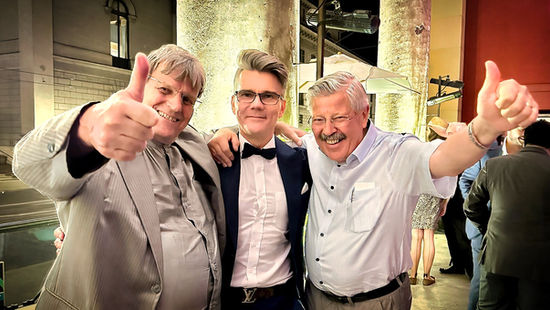

Pitch Your CleanTech Disruption
#CreateTheFuture #WCSA2023
The Winner

water stuff & sun GmbH
Reshaping the way we store, distribute, and use renewables with SFEERS and the hydrogen battery
Renewable energy can already be produced more cost-efficiently than energy from fossil fuels. However, one of the unresolved challenges of the energy transition is how to store renewable energy and transport it directly and efficiently to the consumer. Especially since renewable energy cannot be produced well in a uniformly distributed manner in terms of location and time. Electrical energy can only be stored in the form of batteries, but the main discussion neglects the limited availability of power grids and scarce resources for battery production - and the battery industry lacks a clear path to large-scale economic recycling.
The best clean energy carrier for storing and distributing renewables is hydrogen.
Yet, the complexity of the hydrogen value chain has resulted in the failure to create a sufficient, marketable hydrogen infrastructure. The lack of infrastructure has been a barrier to the decarbonization of mobile applications.
CBC TV Talk with The #WCSA2023 Winner

The Finalists
Advanced Dynamics Limited
Cassetex is a network of solar powered battery swapping stations for 1.5+million electric last mile vehicles in Bangladesh.
Over 1.5 million electric 3-Wheelers across Bangladesh is the only income source of the operator and his family. The number of vehicles increased rapidly without much oversight, leading to energy management problems at the fossil fuel driven national grid. Moreover the use of inefficient toxic lead-acid batteries and replacement cost of the battery every year, stuck the vehicle operators in the loan cycle forever. “Cassetex'' is a solar-powered battery swapping station service for electric last-mile transport. Using Battery ATM our registered customer can swap multiple times a day and they pay the energy bill through mobile banking. Li-ion batteries are charged efficiently, so safety, life and the range of vehicles are also extended, doubling the daily income of operators.
Aed Energy Ltd
Lowering the cost of decarbonised power & heat
Within a short span of less than 20 years, wind & solar have now become the cheapest sources of electricity, however electricity grids are not designed for intermittent power - causing issues in frequencies, grid congestion, and inherent mismatches between energy supply and demand.
Which is why Energy Storage is system critical, because it provide the system balance needed to achieve decarbonisation.
The problem is, our current options are too expensive and not easily deployable at scale. We intend to solve that problem through our breakthrough thermal energy batteries.
KIRU ENERGY LIMITED
Mini-Grid in the City™ (MGC)
In Nigeria, more than 17 million households and 23 million small and medium enterprises rely on fuel-guzzling and polluting generators to keep their homes and businesses powered with electricity. In Lagos, 40% of the population have no access to grid electricity and about 80% rely heavily on diesel generators to manage outages. Approximately, $1.8 billion is spent on small-scale generators annually. More so, higher operating costs for generators usage and maintenance means higher cost of doing business. Not least, the health and environmental risks posed by air and noise pollution. Another challenge in a city such as Lagos is the rapid urbanization and population growth rate which is outpacing the infrastructure development efforts to meet growing demand for electricity, adequate housing and seamless transportation. This leads to the spread of shanty towns and poorly planned suburbs within the city which affects the efficient distribution of electricity and other resources.
SkyH2O Inc.
Water security, sustainability, and resilience.
Currently, the state of potable drinking water comes to in two forms: municipal water which is often contaminated or scarce, and bottled water which utilizes municipal water and has a high carbon footprint. You can guaranty the quality of water at the water treatment facility, but once it hits the aging and decrepit pipe and plumbing infrastructure, you are on your own. Shipping heavy bottled water from Fiji or Atlanta is no longer sustainable. Plus the world would benefit from less plastic in the oceans.
















































